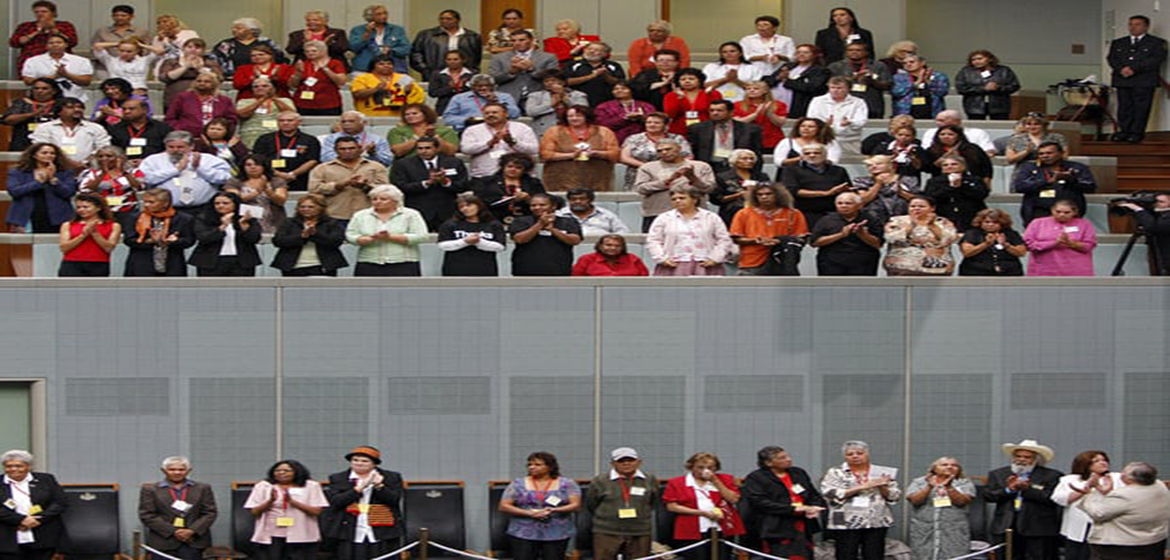By Jack Latimore
On the 10th anniversary of the national apology to the stolen generations it is crucial that we not permit 13 February to become a virtue-signalling mechanism for the commonwealth of Australia. As revealed yet again when the on Thursday morning, there is a long way to go before Australia can stake any claim to realising the reconciliation it promised that day in 2008.
Any government emphasis on the apology has to acknowledge the ongoing impacts of the forced removals of First Nations children from their families and communities. It needs to continues to inflict on Aboriginal and Torres Strait lives. 13 February needs to be the sharpest spur to the side of government, not a public relations celebration of soft reconciliation. Where there was great hope a decade past, now should stand principally as a day of shame and accountability for government, regardless of its political persuasion.
When the inquiry into the separation of Aboriginal and Torres Strait Islanders’ families from their children handed over its report in 1997 it found that a generation of Aboriginal and Torres Strait Islanders “endured gross violations of their human rights. These violations continue to affect Indigenous people’s daily lives. They were an act of genocide, aimed at wiping out Indigenous families, communities and cultures.”
The described the traumatic effects of the forced removal of Indigenous children between 1910 and 1970. With almost unrelenting detail, it tells of how Indigenous children stolen by the state were frequently exploited and abused, faced restricted opportunities for education, were commonly emotionally deprived, that sexual abuse was common. And all of this brutality underscored the loss of their family and community’s First Nations heritage.
The 1997 report also found that the consequences of these experiences was varied and lasting. Substance abuse, entrenched unemployment, poor health, mental illness, higher rates of incarceration and lateral violence were the symptoms of the trauma endured in life by survivors of the stolen generations. It’s extraordinary then that, 21 years on, so few government policies are trauma responsive.
Speak to a clinical psychologist about the nature of trauma and you gain an understanding of the holistic approach involved in addressing how trauma disrupts and destroys. That approach is routinely resource heavy. Government policy in this direction prefers a quicker, cheaper fix.
The information inside the covers of the Bringing Them Home report has never sat well with the government. When it was handed over in 1997, John Howard, the then prime minister, effectively publicly rubbished it and the commission behind it.
The fly in Howard’s vanishing cream was the statement within the report that found “when a child was forcibly removed that child’s entire community lost, often permanently, its chance to perpetuate itself in that child. The inquiry has concluded that this was a primary objective of forcible removals and is the reason they amount to genocide.”
I recall the immediate hurt Howard’s response caused within my community circles and the ensuing pain that he perpetuated over the next decade as he obdurately refused to say sorry. For this alone, he should never be remembered well.
It was the account of “Confidential evidence 10, Queensland” that grabbed me when I first read the report in ‘97. It was the statement of a woman from New South Wales who was forcibly removed in the 1940s and placed in :
I was there for 16 years and I was brainwashed every day of the week. You never go near blacks. Your people don’t want you anyway. They’re just dirty. They don’t want anything to do with you … We were playing in the schoolyard and this old black man came to the fence. I could hear him singing out to me and my sister. I said to [my sister], ‘Don’t go. There’s a black man’. And we took off. It was two years ago I found out that was my grandfather. He came looking for us. I don’t know when I ever stopped being frightened of Aboriginal people. I don’t know when I even realised I was Aboriginal. It’s been a long hard fight for me.
My grandmother and her sisters had also been taken, grabbed from their home on the Burnt Bridge Mission in Kempsey and removed 800km south to the same Cootamundra home by the so-called Aboriginal Protection Board. One aunt for the ABC on 13 February, 2008:
It was shocking in there... we were made to get out at 6 o’clock in the morning and scrub the cement in summer or winter. They told us it was to take the savage out of us.
My family’s experiences with forcible removals had never been discussed openly before 1997. There was undoubtedly various forms of shame attached which kept it out of easy conversation but growing up I heard enough about Cootamundra and to understand in a vague way the anxiety invoked by mention of them. Even as I went through primary and secondary school in the 80s and early 90s my mother used to fret about welfare officers appearing at the door to take me away from her.
The difficulty and reluctance in recognising the way this intergenerational trauma impacts upon the lives of First Nations people says a lot about white Australia and what it considers acceptable from its governments.
What none of us should accept is the national apology becoming a red-letter day for the assuagement of white guilt, particularly as the Turnbull government attempts to abandon targets on addressing Indigenous disadvantage under the guise of a “Closing the Gap refresh”.
There were big historical acknowledgements and even bigger promises for the future made on 13 February 2008. First Nations people and our allies continue to hold the so-called commonwealth accountable to them.
Source:
Related to SDG 10: Reduced inequalities and SDG 16: Peace, justice and strong institutions



